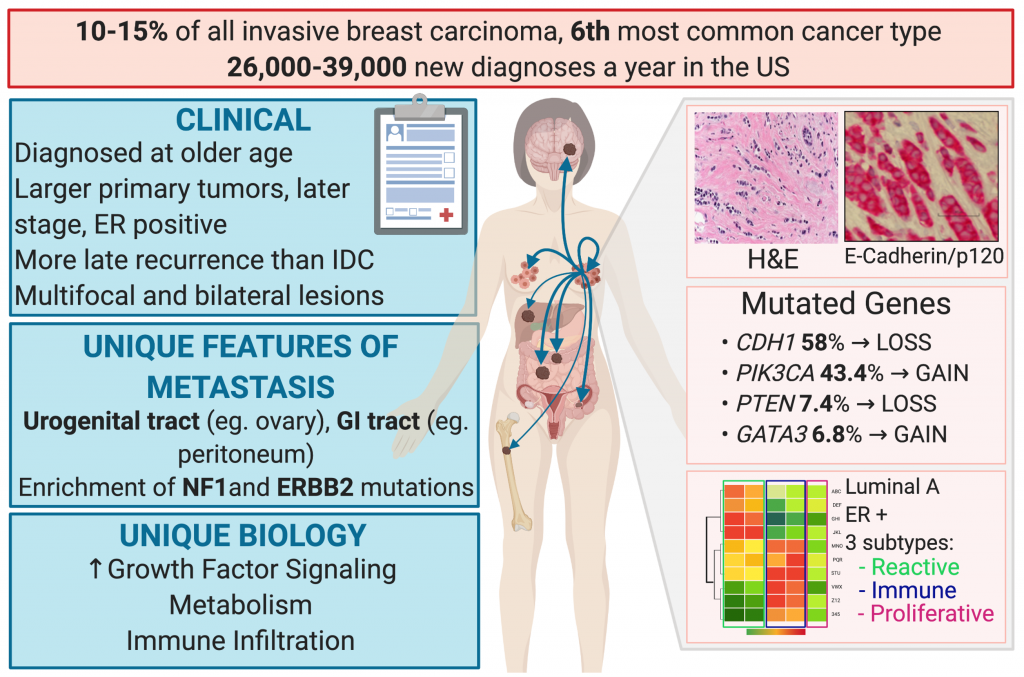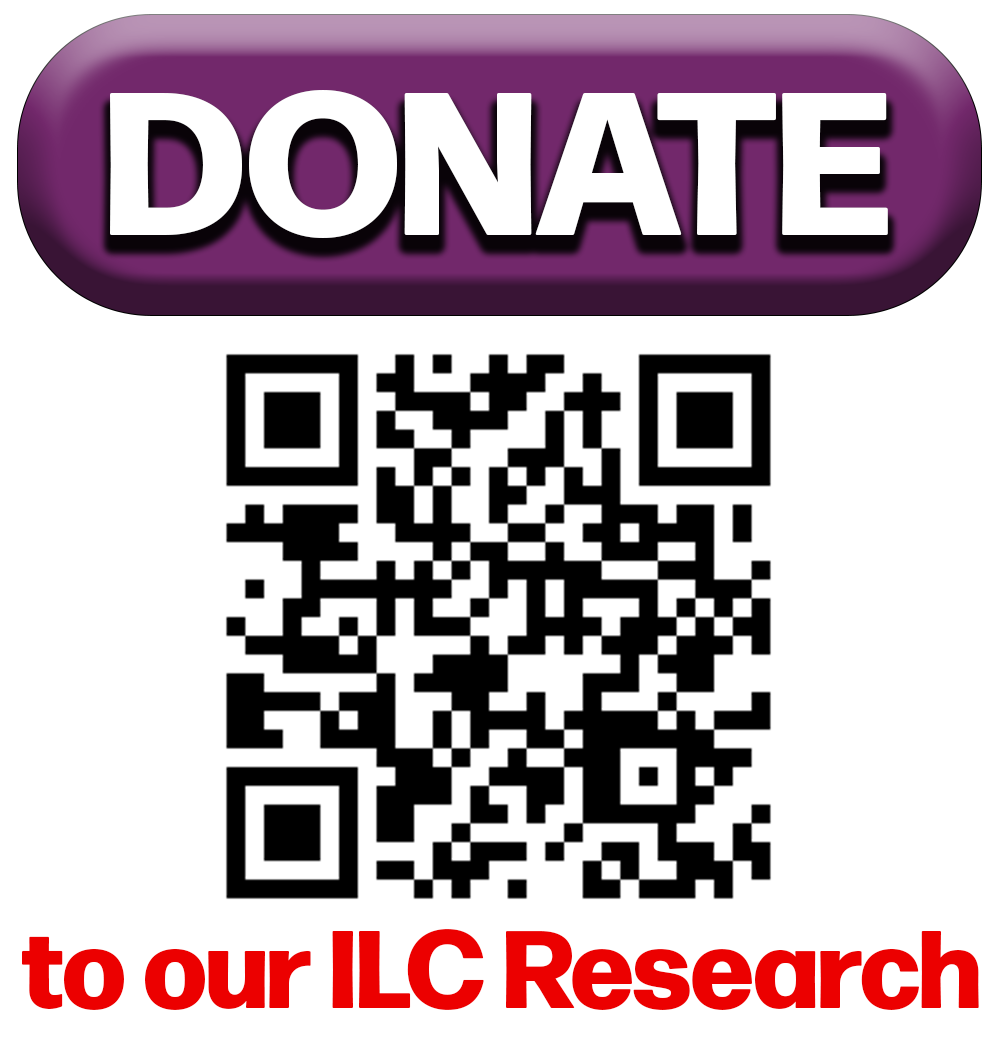Research:
INVASIVE LOBULAR BREAST CANCER
Invasive lobular breast cancer (ILC) is the second most common histological subtype of breast cancer, after the more common invasive ductal breast cancer (IDC). ILC accounts for ~10%-15% of all breast cancers (~27-40,000 annually) and ranks as the 6th most common cancer in women. The hallmark of ILC is loss of E-cadherin, a protein mediating cell-cell attachment. ILC has been chronically understudied, since it is generally considered to have an excellent prognosis, and in general to be very similar to ER+ IDC. However, there is increasing evidence for a unique biology in ILC, including ILC metastases, and thus more research is needed to fully understand this subtype, in order to improve clinical outcome and identify drug targets for metastatic ILC. Importantly, despite showing better prognostic and predictive factors (e.g. more often ER+/PR+, and lower levels of the proliferation marker Ki67), there is increasing evidence that patients with ILC have worse long-term outcome compared to IDC. Our group has focused on ILC over the last 10 years, and in 2016 we organized the 1st International ILC Symposium that lead to the formation of a national patient advocacy group – Lobular Breast Cancer Alliance.

We participated in the TCGA analysis of ILC that identified unique molecular alterations (Ciriello et al., 2015), and we subsequently expanded this study including other data sets identifying changes in metabolism, protein translation and expression of immune-related genes (Du et al., 2018b). We have shown unique action of ER in ILC (Sikora et al., 2014), with potential relevance for response to endocrine treatment. Other potential mediators of treatment resistance are overexpression of Wnt 4 (Sikora et al., 2016; now studied by former postdoc Dr. Matthew Sikora, in his own lab at University of Colorado, Denver), ESR1 and MDM4 amplifications (Cao et al., 2019), changes in fatty acid metabolism (Du et al., 2018a) and overexpression of cortactin.
A focus of our work is the generation and characterization of ILC models (Tasdemir et al., 2018), which are critical for enhancing translational ILC research. We also study growth factor signaling in ILC, specifically IGF1R (Nagle et al., 2018) and FGFR4 signaling (Levine et al., 2019). Finally, in collaboration with the Vignali lab we have begun to characterize the immune infiltration in lobular tumors (Du et al., 2018b; Oesterreich et al., 2018).
Endocrine Resistance | Breast Cancer Metastasis | Precision Medicine
Cao, L., Basudan, A., Sikora, M. J., Bahreini, A., Tasdemir, N., Levine, K. M., Jankowitz, R. C., McAuliffe, P. F., Dabbs, D., Haupt, S., et al. (2019). Frequent amplifications of ESR1, ERBB2 and MDM4 in primary invasive lobular breast carcinoma. Cancer Lett 461, 21-30.
Ciriello, G., Gatza, M. L., Beck, A. H., Wilkerson, M. D., Rhie, S. K., Pastore, A., Zhang, H., McLellan, M., Yau, C., Kandoth, C., et al. (2015). Comprehensive Molecular Portraits of Invasive Lobular Breast Cancer. Cell 163, 506-519.
Du, T., Sikora, M. J., Levine, K. M., Tasdemir, N., Riggins, R. B., Wendell, S. G., Van Houten, B., and Oesterreich, S. (2018a). Key regulators of lipid metabolism drive endocrine resistance in invasive lobular breast cancer. Breast Cancer Res 20, 106.
Du, T., Zhu, L., Levine, K. M., Tasdemir, N., Lee, A. V., Vignali, D. A. A., Houten, B. V., Tseng, G. C., and Oesterreich, S. (2018b). Invasive lobular and ductal breast carcinoma differ in immune response, protein translation efficiency and metabolism. Sci Rep 8, 7205.
Levine, K. M., Priedigkeit, N., Basudan, A., Tasdemir, N., Sikora, M. J., Sokol, E. S., Hartmaier, R. J., Ding, K., Ahmad, N. Z., Watters, R. J., et al. (2019). FGFR4 overexpression and hotspot mutations in metastatic ER+ breast cancer are enriched in the lobular subtype. NPJ Breast Cancer 5, 19.
Nagle, A. M., Levine, K. M., Tasdemir, N., Scott, J. A., Burlbaugh, K., Kehm, J., Katz, T. A., Boone, D. N., Jacobsen, B. M., Atkinson, J. M., et al. (2018). Loss of E-cadherin Enhances IGF1-IGF1R Pathway Activation and Sensitizes Breast Cancers to Anti-IGF1R/InsR Inhibitors. Clin Cancer Res 24, 5165-5177.
Oesterreich, S., Lucas, P. C., McAuliffe, P. F., Bruno, T. C., and Vignali, D. A. A. (2018). Opening the Door for Immune Oncology Studies in Invasive Lobular Breast Cancer. J Natl Cancer Inst 110, 696-698.
Sikora, M. J., Cooper, K. L., Bahreini, A., Luthra, S., Wang, G., Chandran, U. R., Davidson, N. E., Dabbs, D. J., Welm, A. L., and Oesterreich, S. (2014). Invasive lobular carcinoma cell lines are characterized by unique estrogen-mediated gene expression patterns and altered tamoxifen response. Cancer Res 74, 1463-1474.
Sikora, M. J., Jacobsen, B. M., Levine, K., Chen, J., Davidson, N. E., Lee, A. V., Alexander, C. M., and Oesterreich, S. (2016). WNT4 mediates estrogen receptor signaling and endocrine resistance in invasive lobular carcinoma cell lines. Breast Cancer Res 18, 92.
Tasdemir, N., Bossart, E. A., Li, Z., Zhu, L., Sikora, M. J., Levine, K. M., Jacobsen, B. M., Tseng, G. C., Davidson, N. E., and Oesterreich, S. (2018). Comprehensive Phenotypic Characterization of Human Invasive Lobular Carcinoma Cell Lines in 2D and 3D Cultures. Cancer Res 78, 6209-6222.

